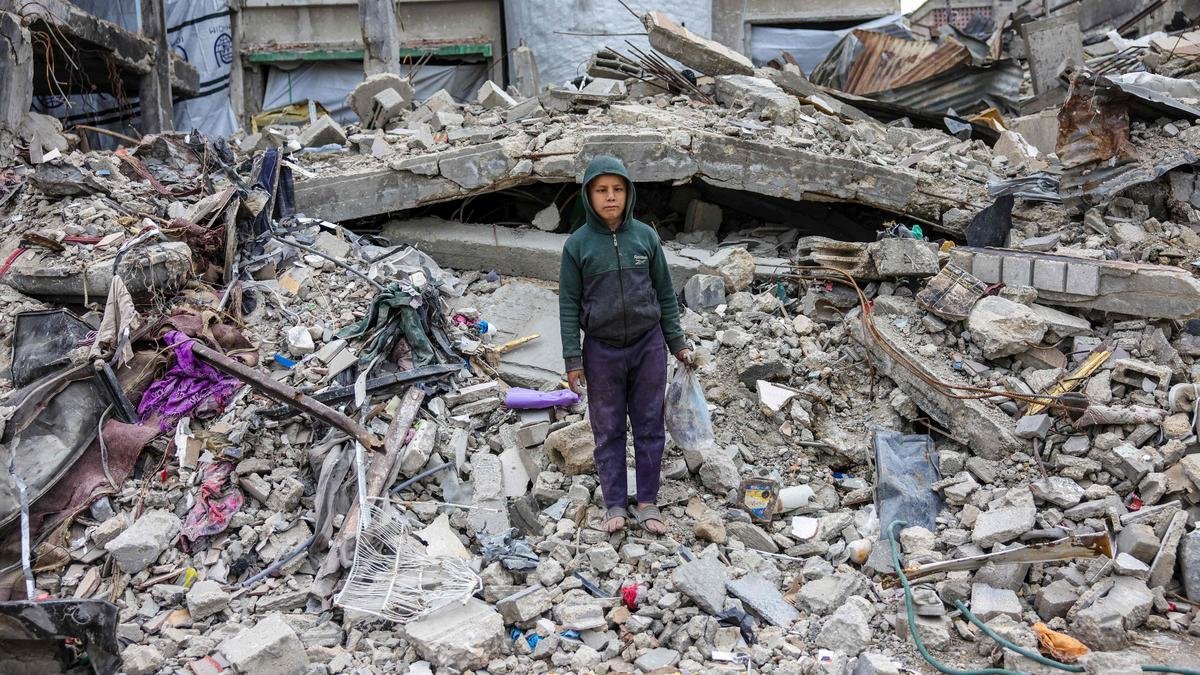
A 10-year-old boy in front of his destroyed home at Jabalia in northern Gaza Strip. | Photo Credit: AFP
Over the last year, I remained outraged at the heart-rending images streaming in of children buried alive under rubble, mothers screaming over their dead babies and thousands starving. The dreams of the young are sadly buried along with them, a heartbreaking humanitarian crisis indeed. The senseless slaughter of innocent children and loved ones remains cold-heartedly disregarded, as countless lives shattered by shrapnel and explosives become mere pawns in a game of political expediency and rabid ethnicity. We are compelled to recall Pablo Neruda’s poignant cry: “Come and see the blood in the streets,/ Come and see,/ The blood in the streets!” These haunting lines echo through the ravaged streets, a testament to the enduring cost of human suffering and bloodshed.
Ever since the ruthless Israeli bombing began, the untold story of Lebanon’s history comes to my mind, a sad story of decline from a land of peaceful coexistence to a land torn apart by ethnic violence.
It gives me some solace to see West Asia returning to a period of respite after teetering on the brink of an apocalypse. However, it’s essential to note the situation remains fragile and requires international support to ensure a lasting peace. The devastating legacy of conflict, etched on the land for decades to come, resonates deeply with those who empathise with the plight of war-torn nations.
I see in West Asia and particularly in Gaza and Lebanon’s history an unyielding aspiration that has been tempered by the fire of struggle and the ache of unhealed wounds. The land is stained by the ravages of fratricidal wars that have scorched the landscape and left deep fissures. Revisiting Lebanon’s past in the years following its independence from France in 1943, or before displacement of Palestinians, often referred to as the “Nakba”, during the 1948 Arab-Israeli War, I visualise the inhabitants revelling in a period of relative stability and progress. To me, Lebanon and Palestine have always been renowned for their storied past and cultural tapestry, a tumultuous history punctuated by fleeting moments of serenity.
Distant memory
Though memories of Lebanon’s peaceful past now seem distant, many still remember the Lebanese cuisine that gained international recognition during those joyful days when tourism peaked with 1.5 million visitors in 1974. Its groundbreaking system of governance, where Christians and Muslims shared power, showcased the country’s commitment to unity and diversity. My thoughts wander back to a bygone era, when its tranquil existence remained unblemished by the sectarian, tribal, and regional fault lines that would eventually fracture the harmonious world cherished by the elders of the land. As Milan Kundera once remarked, it is always “the struggle of memory against forgetting”. Beirut, once called the “Paris of the Middle East”, gradually turned into a searing cauldron of fire. Calmness gave way to extreme volatility.
Thinking about the recent battering of Gaza and Lebanon, Pablo Neruda’s “I’m Explaining a Few Things” becomes relevant. A poem about the Spanish Civil War, it can be seen as a parallel to the decline of Gaza and Lebanon: “You are going to ask: And where are the lilacs?/ and the poppy-petalled metaphysics?/ and the rain repeatedly spattering/ its words and drilling them full/ apertures and birds?” And then “one morning all that was burning/ one morning the bonfires / leapt out of the earth/ devouring human beings…”
At this juncture, it is vital for humanity to find a critical solution to halt this destabilisation from spiralling out of control. Understandably, the ongoing West Asian crises underscores one of the most pressing issues of our time: the imperative for global action to protect human dignity, promote social justice, and ensure peaceful coexistence. Moreover, the recent threat of nuclear war spurred by the skirmish with Iran serves as a stark reminder that there will be no time for regrets or post-mortem once the overwhelming consequences unfold. The international community’s deafening silence and refusal to acknowledge culpability of Israel has compounded the tragedy, abandoning Lebanon and Gaza to confront the ruins of their own resilience.
And now with U.S. President Donald Trump’s imperiously absurd idea of turning Gaza into the “Riviera of the East” by relocating the Palestinians in Jordan and Egypt resoundingly violates the resolutions of the United Nations Security Council supporting the Palestinian right of self-determination.
It is the infraction of the basic sense of humanism resulting in an endless trauma that has scarred the region for years. A forthright indictment of the mishandling of West Asia and the miserable failure of the peace-keeping agencies to punish the culpable must underscore the sacrifice of innocence and truth in a trade-off between political pragmatism and principle.
W.B. Yeats’s statement in his poem The Second Coming says it all: “The best lack conviction, while the/ worst/ Are full of passionate intensity.” It’s nothing but a cry of despair, a regretful murmur, and a scathing critique.
shelleywalia@gmail.com
Published – February 23, 2025 04:05 am IST
